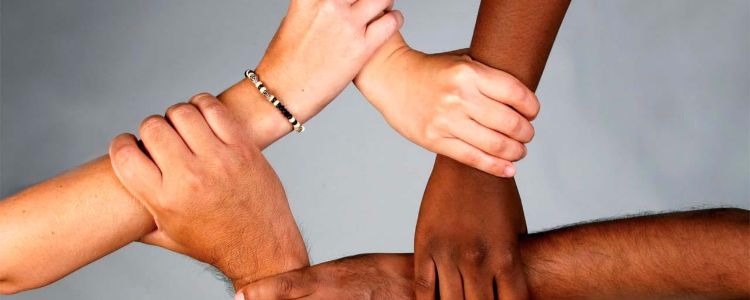How to Address the Troubling Lack of Diversity Among Eating Disorders Professionals
Many of us from minority communities, whether it be our race/ethnicity, sexual orientation/gender identity, foreign/immigration status, or any other such factor, share an unfortunately common experience moving through the world: being the only one of your group in a room.
This “room” may be a classroom, a waiting room, a workplace, a party or event, or even a terminal at an airport. It doesn’t really matter what the context is, the experience remains the same.
There’s the initial recognition upon walking in that you are the only (fill-in-the-blank) in the room, followed by the realization that others are also slowly recognizing that you are the only (fill-in-the-blank) in the room, culminating in the internal debate about which persona you should adopt to best manage the given situation.
(There is also the corollary to this situation which is when there is ANOTHER one of “you” there, which might bring the comfort that maybe I can go over and hang with them, but also the dilemma of wondering whether that is just going to make us both stand out even more.)
This illustrates a constant source of conflict for many minorities in the United States, namely the tension between feeling invisible on the one hand and feeling TOO visible on the other. We want to be seen for ourselves rather than as a representative of our group, but we are nevertheless of a community.
Now imagine the impact of this scene, which gets played out for many of us on an almost daily basis in some form or another, on someone from a marginalized community entering treatment for an eating disorder, whether it’s their first time or their 10th time. This person is probably scared, likely struggling with intense shame, and already feeling like they are broken and don’t belong because these are the true core features of eating disorders. If this person is also from a minority or marginalized group, imagine how much all of this is magnified if you also have to worry about whether any of your treatment providers can understand this fundamental experience of being “the other.”
Lack of Diversity in Mental Health
According to data examining the racial and ethnic make-up of the mental health workforce [1], nearly 90% of mental health professionals are White, in contrast to the 30% of the overall United States population made up of people from various ethnic minority groups. This discrepancy is even more concerning in light of the fact that the communities which have the greatest shortages of mental health professionals also tend to be communities with a high proportion of racial and ethnic minorities.
Just last year, there was a growing call from students of color and LGBTQ students at many universities demanding more mental health resources on college campuses and, in particular, counseling staff who were as diverse as the student bodies themselves. Students of color represent just under half (45.4%) of the college students in the United States [2], but the overwhelming majority of staff at counseling centers are White, with staff of color representing a disproportionately low 27.8% of college counseling centers’ clinical staff [3]. Beyond just having staff that are more representative in their diversity, the students’ real demand was for greater focus on competency in staff’s ability to deal with issues related to marginalization, discrimination, and other issues related to minority status and stress.
The Need for Diversity Among Professionals Who Treat Eating Disorders
We face this same issue in the eating disorder treatment world. This lack of diversity in our profession as a whole certainly exists, and probably to an even greater degree, among eating disorder specialists.
As an Asian-American who has been involved in the treatment of eating disorders for over 18 years, I can’t tell you how many times I have been the only person of color in the room (or at least among the very few). I have been on panels addressing the issue of diversity in eating disorder treatment and know that both patients and professionals are concerned about our collective ability to provide culturally competent treatment for ALL people struggling with eating disorders.
It has been well established that eating disorders do not discriminate. Women and men from ethnic minority groups and those in LGBTQ communities suffer from eating disorders at similar or higher rates than in the general population. On top of the serious impact that eating disorders have on all those affected, people from ethnic minority groups and from the LGBTQ community must often grapple with long histories of additional stigma and marginalization, resulting in multiple doses of shame and understandable reasons for experiencing self-hatred. Experiences of microaggressions, discrimination and marginalization, and the other stressors associated with minority status puts people from these communities at particularly high risk for the development of disordered eating behaviors and their attendant consequences.
Despite this high risk, there is a vast disparity in the actual utilization of mental health services among those from marginalized and minority groups. People from these groups are under-identified by professionals and tend to receive treatment for eating disorders at significantly lower rates.
These disparities reflect a profound need for clinicians from marginalized communities and culturally competent assessment and treatment services for members of marginalized communities who are struggling with eating disorders. Especially if you come from a culture or family where seeking help for mental health issues is stigmatized, seeking professional help is often prefaced with the all-too important question: “Will the person who is supposed to help me actually ‘get’ me?” When treatment providers do not reflect the overall diversity of their clients, this lack of diversity can be a significant barrier to engagement in treatment.
The Need for Cultural Competency in Eating Disorder Treatment
The importance of having eating disorders clinicians from marginalized communities is not simply a matter of “matching” based on ethnicity or sexual orientation, for example. More broadly, it’s the idea that professionals who have a diversity of life experiences, especially when they revolve around issues of marginalization and discrimination, might be better able to cross that experiential gap without the client having to “educate” or “explain” their culture.
Beyond the need for a greater influx of mental health clinicians from minority and marginalized communities, there is an overall pressing need for greater levels of cultural competency for all mental health professionals. Given the diversity of those struggling with eating disorders, cultural competency among care providers is crucial in providing effective treatment. This competency is particularly important in the context of illnesses as complex and multifaceted as eating disorders.
It is essential for all therapists, dietitians, physicians, nurses, and other professionals to possess cultural knowledge and be able to apply such cultural understanding to treatment. It is important when delivering such care to know when to generalize from a client’s cultural experience or background (without stereotyping) and when to individualize interventions. Providers should be able to form and test hypotheses about how and if cultural factors might be operating in a client from a non-majority culture and how to proceed accordingly.
So how do we start to dismantle these cultural barriers in eating disorder treatment?
Speaking as a treatment provider, I think it has to start with some collective soul-searching. None of this happens without a willingness to have the uncomfortable conversations and the explicit intention to ask ourselves (as well as others) the uncomfortable questions.
• We all have cultural blind-spots which can lead to incorrect assumptions. Are you aware of yours?
• We all have prejudices and hold stereotypes which are important to be aware of and examine. Are you doing that?
• Specifically, for those of us in organizations, programs, clinics, and teams:
o Do our teams and our leadership adequately reflect the diversity of experiences of the communities we are serving?
o How can we better encourage and develop professionals from marginalized communities?
o Are we providing adequate training on cultural competencies for all of our staff?
I am beyond proud and continually humbled to be a part of this community of passionate, dedicated, and caring people who are involved in raising awareness, advocacy efforts, and making sure we are providing the best possible treatment for all those people who struggle with eating disorders. By being willing to engage in the intentional action of asking ourselves these difficult and uncomfortable questions, we demonstrate that we understand the singular importance of being “gotten.”
Norman completed his B.A. at Yale and his Ph.D. in Clinical Psychology at UCLA. He is the National Director for Program Development for Reasons Eating Disorder Center and Center for Change, and is on the Board of Directors for the Eating Disorders Coalition. Norman has developed an expertise in treating and teaching about psychiatrically complex populations, multi-modal treatment, and diagnostic assessment with a particular focus on Eating Disorders, Trauma, and Bipolar Disorder. He is a regular national speaker, educator, and passionate advocate for eating disorder awareness.
Norman would also like to acknowledge the contributions of his collaborators in this work, Dr. Charlynn Small of the University of Richmond and Dr. Mazella Fuller of Duke University.
References
- U.S. Department of Health and Human Services, Substance Abuse and Mental Health Services Administration. Mental Health, United States (2010). Retrieved from https://store.samhsa.gov/shin/content//SMA10-4590/SMA10-4590.pdf.
- U.S. Department of Education, National Center for Education Statistics, Higher Education General Information Survey (HEGIS) (2015), Integrated Postsecondary Education Data System (IPEDS), “Fall Enrollment Survey” (IPEDS-EF:90); and IPEDS Spring 2001 through Spring 2015, Fall Enrollment component. Retrieved from https://nces.ed.gov/programs/digest/d15/tables/dt15_306.10.asp?current=yes.
- Reetz, D. R., et al. (2015). The association for university and college counseling center directors annual survey. Retrieved from Association for University and College Counseling Center Directors website: https://www.aucccd.org/assets/documents/aucccd%202015%20monograph%20-%20public%20version.pdf
This story is part of the Marginalized Voices Project sponsored by Reasons Eating Disorder Center. Learn more.





